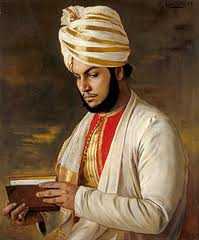Munshi

Munshi (Urdu:مُنشی; Hindi: मुंशी ) is a Persian word originally the name of a contractor, writer or secretary, later used in Mughal Empire and British India of the native language teachers or secretaries employed by Europeans.[1]
Etymology
Munshi (Persian منشی) is a Persian word and it was given as an honorary title to a person who has achieved a mastery over languages, especially in British India. It became a surname to those people whose ancestors had received this title. In modern Persian this word is also used to address clerks and secretaries, so they also use it as their surname.
In Education
Today Munshi is also a degree in South Asia, that is given after passing a certain course for example basic reading, writing, and maths. The advanced degree was Munshi Fazil or Munshi Fadhil. Munshi is also a title that a graduate of a Munshi course is allowed to attach to his name.
Munshies in Service of the Mughals
Munshies in Service of the Rajputs
Munshies in Service of the Nawabs
Munshies in Service of the British
Since in British India Munshies were hired as clerks in the government, the word Munshi also became the name of their profession. The Munshies worked as accountants and secretaries as well. The family name Munshi belongs to people whose families were in the profession of Munshi and hence were respected as literate people. Abdul Karim, known as "The Munshi" was an especially valued and respected Indian servant of Queen Victoria.[2]
See also
- Munshi Hakimuddin
- Premchand
- Kanhaiyalal Maneklal Munshi
- Munshi Abdur Rouf
- Abdullah bin Abdul Kadir
References
- ↑
 Chisholm, Hugh, ed. (1911). "Munshi". Encyclopædia Britannica 19 (11th ed.). Cambridge University Press
Chisholm, Hugh, ed. (1911). "Munshi". Encyclopædia Britannica 19 (11th ed.). Cambridge University Press - ↑ Visram, Rozina (2004). "Karim, Abdul (1862/3–1909)". Oxford Dictionary of National Biography. Oxford University Press. doi:10.1093/ref:odnb/42022. (subscription required) for full access